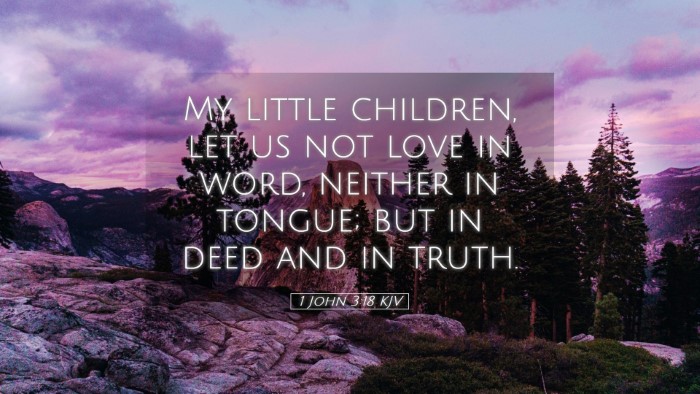Old Testament
Genesis Exodus Leviticus Numbers Deuteronomy Joshua Judges Ruth 1 Samuel 2 Samuel 1 Kings 2 Kings 1 Chronicles 2 Chronicles Ezra Nehemiah Esther Job Psalms Proverbs Ecclesiastes Song of Solomon Isaiah Jeremiah Lamentations Ezekiel Daniel Hosea Joel Amos Obadiah Jonah Micah Nahum Habakkuk Zephaniah Haggai Zechariah Malachi1 John 3:18
1 John 3:18 KJV
My little children, let us not love in word, neither in tongue; but in deed and in truth.
1 John 3:18 Bible Commentary
Commentary on 1 John 3:18
Verse: “My little children, let us not love in word, neither in tongue; but in deed and in truth.” (1 John 3:18, KJV)
This verse encapsulates the essence of genuine Christian love, emphasizing action over mere words. In the context of John’s epistle, it highlights the distinction between superficial expressions of affection and the deep, sacrificial love that characterizes true followers of Christ.
Contextual Background
The Apostle John wrote this letter to address the nascent challenges within the early Church, particularly concerning the nature of love, righteousness, and the assurance of salvation. His preferred method of teaching integrates themes of love and truth, making it critical for understanding Christian fellowship and behavior.
Thematic Insights
The theme of love is a recurrent motivation throughout John’s writings. Here, John calls his readers, referred to affectionately as “little children,” to a standard of love that transcends verbal expression. This call acts as a practical guide for a community facing dangers of false doctrine and moral failure.
1. The Call to Authentic Love
Matthew Henry observes that the Apostle asserts a caution against mere verbal declarations of love without corresponding actions. Henry states, “True love will reveal itself in deeds, and is not satisfied with mere professions.” This underlines the principle that love must be demonstrated practically, echoing the teachings of Jesus about sacrificial love.
2. Love as an Action
Albert Barnes emphasizes that Christian love should express itself actively. He writes, “It must be shown in actions, and not in mere words.” This reinforces the idea that faith without works is dead, aligning with James 2:26. In light of this, love is actionable and transformative, urging believers to seek ways to serve one another visibly and meaningfully.
3. The Connection of Truth with Love
Adam Clarke adds a pivotal dimension by connecting love to truth. He comments, “True love must be grounded in truth; our love should conform to the teachings of Christ.” This indicates that acts of love should not only be genuine but also consistent with the doctrines of the faith, ensuring that the believer’s actions reflect the true nature of God’s love.
Practical Applications for Believers
- Reflect on Actions: Every believer should regularly assess whether their expressions of love are backed by actionable commitments to serve and help others.
- Engagement in Community: Churches and congregations must promote initiatives that foster active service, reflecting the love of Christ through volunteering, philanthropy, and support systems.
- Teaching and Discipleship: Pastors and leaders should prioritize teaching on the integration of love and truth, guiding disciples to understand that authentic love cannot be divorced from God’s moral and ethical standards.
Conclusion
In summary, 1 John 3:18 serves as a profound reminder to all believers of the necessity of converting the gospel's truths into tangible acts of love. It challenges us to pursue a faith that lives boldly through both spoken declarations and practical demonstrations of love, aligning our actions with the transformative essence of the Gospel.
Whether one is a pastor, student, theologian, or scholar, this verse encourages us to embody the love that Christ displayed, rooting our actions in the ultimate truth of the Scriptures and enabling us to validate our faith through meaningful deeds.


